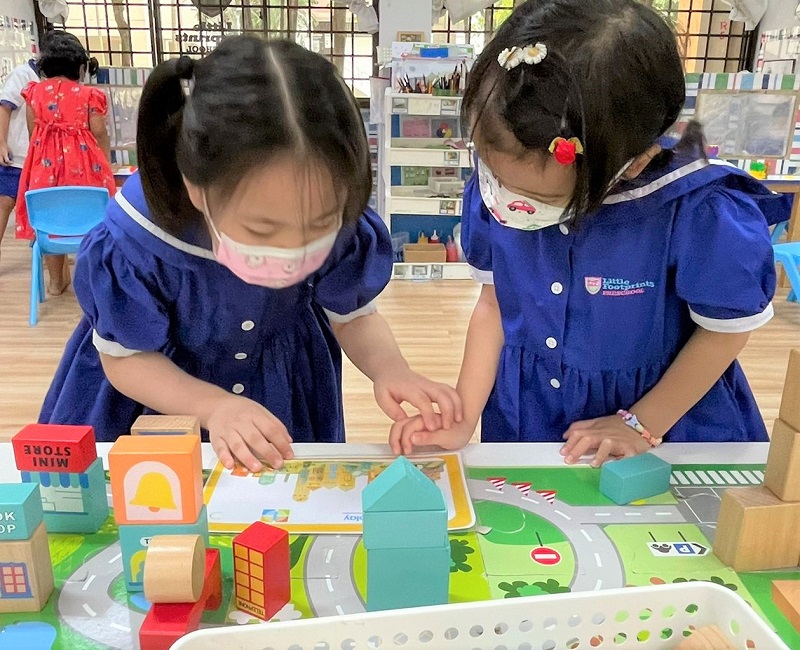Life values are the fundamental core beliefs that guide our behaviours and goals and help us measure our overall success in life. Some examples of life values include courage, kindness, honesty, patience, love and gratitude.
These important life values are typically instilled by parents and preschool teachers from a young age. Having positive values allows your child to form long-lasting, meaningful and trusting relationships with others, make morally-driven decisions and achieve healthy success in their future academic or career endeavours.
Why it is important to raise children with good life values
Instilling good life values at an early age is key to establishing a strong foundation to build your child’s character. These values will mould them to become the person you aspire them to be.

Shaping their moral compass helps your child tell right from wrong and teaches them to correct small mistakes before they snowball into bigger irreparable transgressions. It will also aid in fostering a higher resilience to peer pressure when they reach adolescence or the teenage phase, and cope with difficult situations.
Children with good life values feel good about themselves. This translates to a boost in self-confidence, which helps them develop empathy and positive relationships with people around them.
Most fundamental and important life values that every child must have
Many preschools and childcare centres in Singapore cultivate strong traits and values in our preschoolers. Take Little Footprints Preschool’s specially designed Vitamin C programme, for example, which introduces social and emotional concepts that allows your child to grow up to become a civic-minded and resilient individual.
Parents, let’s work together to develop these important life values in your child. We’ve put together a list and some tips on what you can do to instil these values.
1. Honesty and Integrity
It is a common developmental phase for young children to tell fibs or experiment with lies. This could stem from learning by example from peers or a fear of getting into trouble.

To overturn this, do make an effort to ensure that your child is listened to and not punished for telling the truth. If you have to impose some punishment, make sure it is an appropriate consequence to the wrong-doing rather than a truthful confession.
2. Sharing and Taking Turns
As infants grow into young children, they become aware of territory and property. Helping them to learn to share and take turns will make life easier for them to develop friendships and integrate better socially.
At home, you can engage in role-playing games or board games that introduce the concept of taking turns. Most preschools in Singapore also incorporate this into their curriculum.
3. Respect
Your child tends to be most influenced by you (parents) under the age of 7. Hence, preschool age is the best time to reinforce respect for peers, authority, and themselves.
This life value is a continuous exercise, and you can show them how it’s done by setting and living the example to drive the idea and theory of respect to your child.
4. Kindness and Consideration of others
Kind emotions include sympathy, empathy, guilt for wrongdoing, and pride for acting ethically. Young children learn about kindness from the consequences of their actions and eventually develop empathy as older kids.

Teach your kids about kindness by saying hello to people, creating cards to make others feel special, and using kind words such as “thank you”. Talk to your child about feelings and why someone may feel sad, hurt, angry, or confused. This can be extended to problem-solving to help someone feel better.
5. Gratitude
Young children start out life with an ego-centric view and grow to have a more outward-looking one.
Hence, the preschool years are the best time to teach children to show appreciation by encouraging them to help with thank you notes for presents received or to reflect on the benefits of having friends and family.
6. Learning to Forgive
Young children with a keen sense of justice may find it challenging to forgive. Help your child to understand that forgiveness does not mean forgetting or pretending their feelings were not hurt.
Encourage them to say “that’s ok” after an apology, and express their emotions.
7. Sense of Responsibility
Learning to be accountable for their actions and belongings is a skill that will take them far. Encourage your children to take responsibility for carrying their school bags, tying their shoelaces, putting their belongings away after using them, and helping with simple house chores.
8. Love
Loving attitudes in children are developed when they are shown love. Children learn by watching you and how you demonstrate love and an affectionate spirit to others.

9. Failure as a Stepping Stone to Success
Learning to get up after a fall is an essential life skill that teaches our kids that failure is merely a stepping stone to growth.
10. Determination and Perseverance
Every child has skills that they may find difficult to master, be it social skills, academics, or sports. Be their cheerleader to encourage and cheer them on as they learn to master resilience, determination and perseverance.
Book a tour with Us!
Learn more about our Vitamin C module and the fun and engaging activities that help your child pick up values.

Book a tour with us at your preferred Little Footprints Preschool centre. We have centres island-wide. Visit us at the centre most convenient for you and let us be a part of your child’s early childhood education journey.
Follow us on social media to stay updated on the latest updates and happenings:




